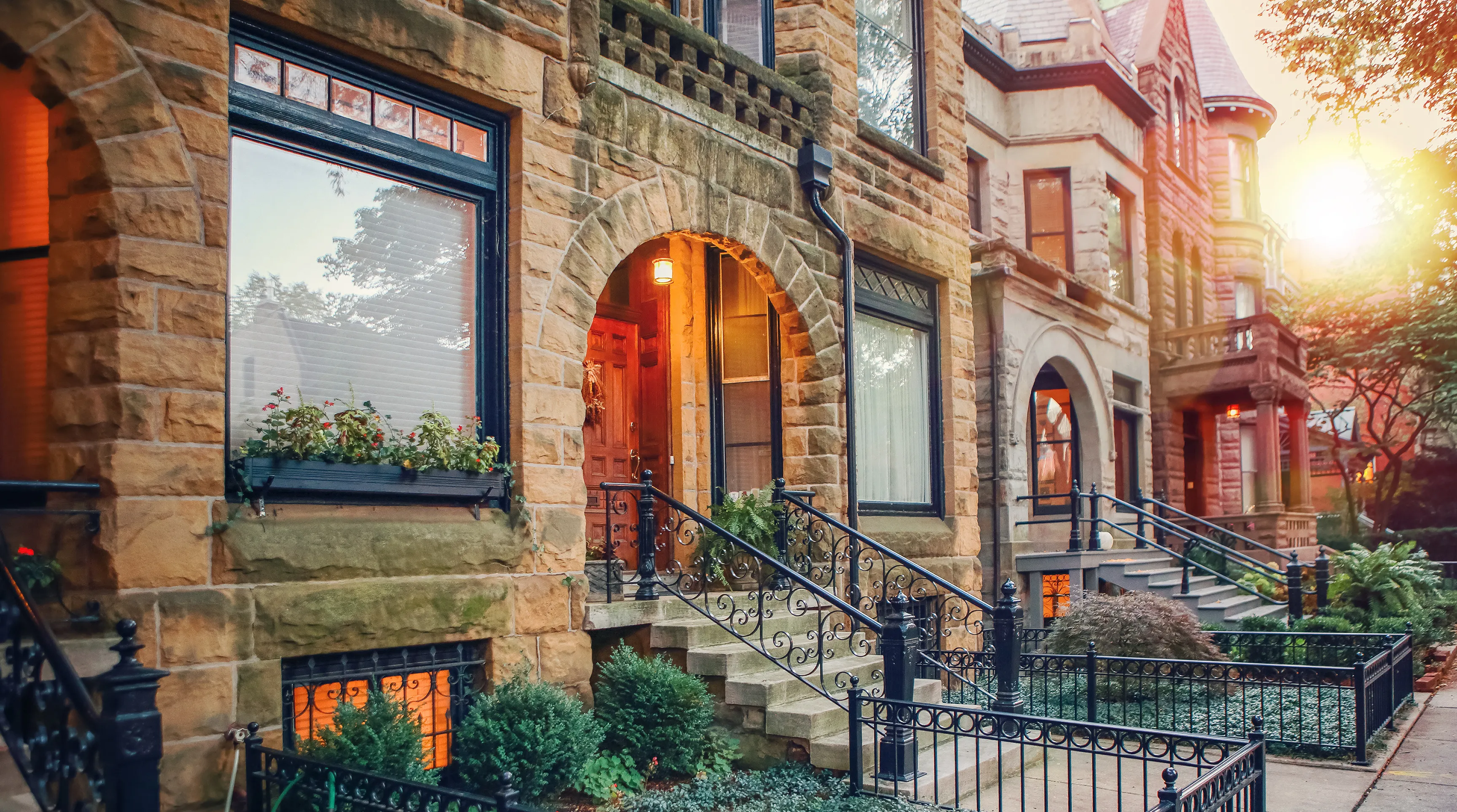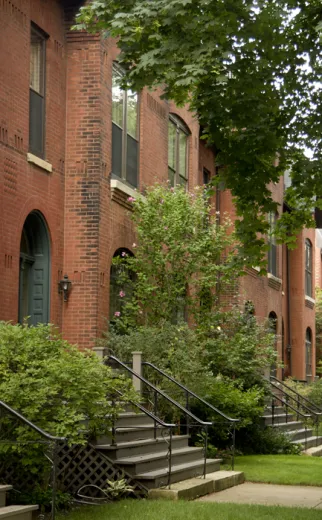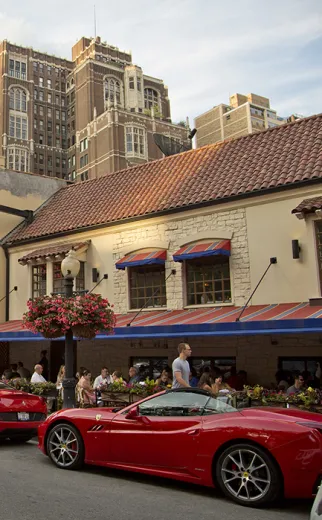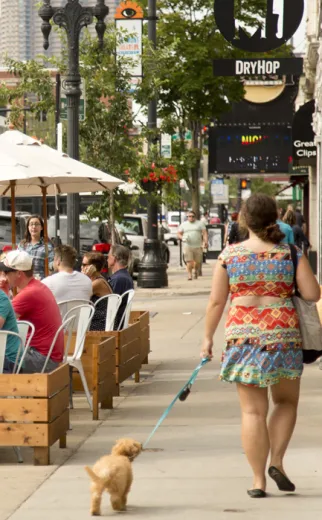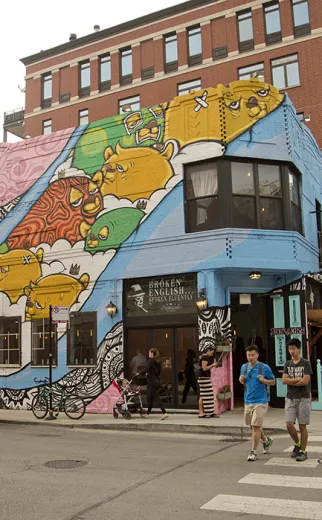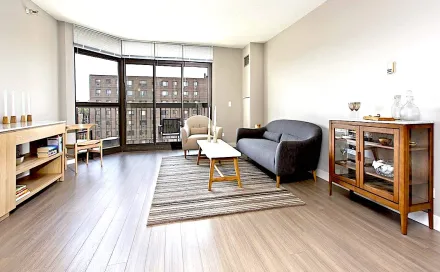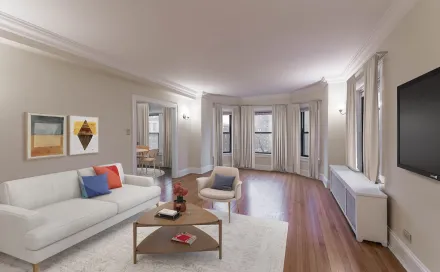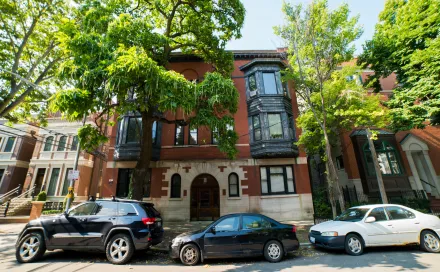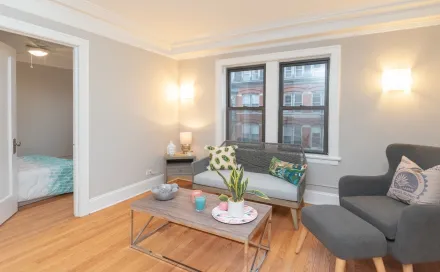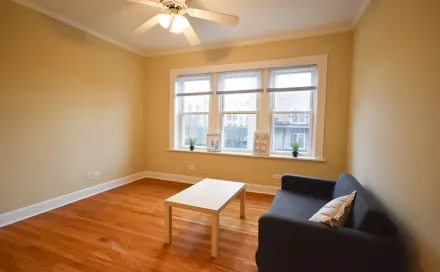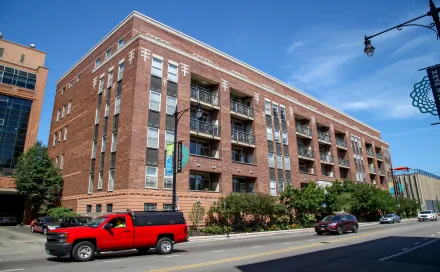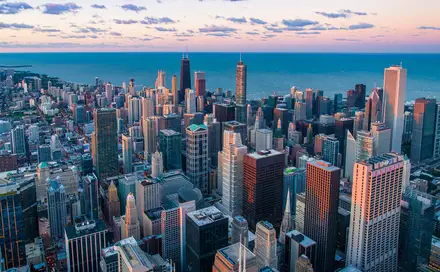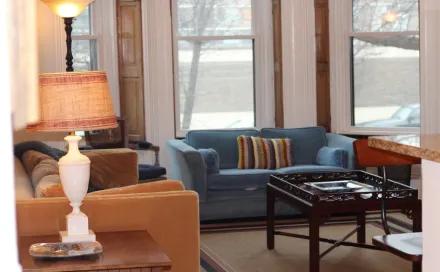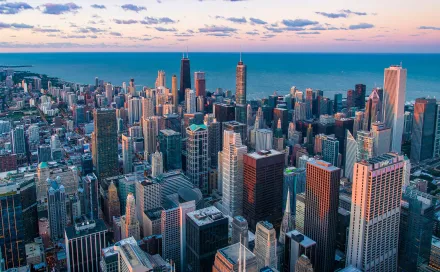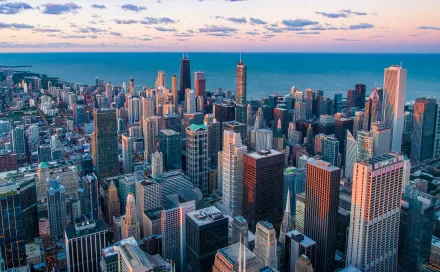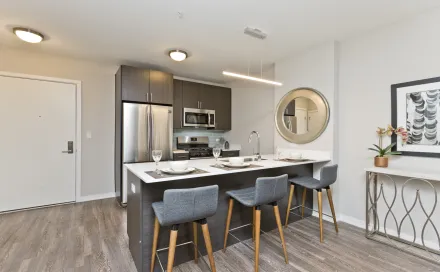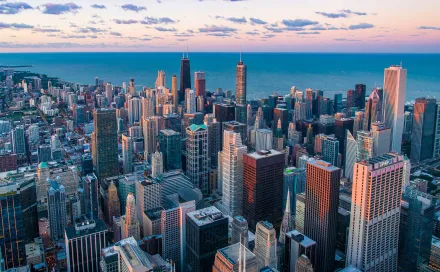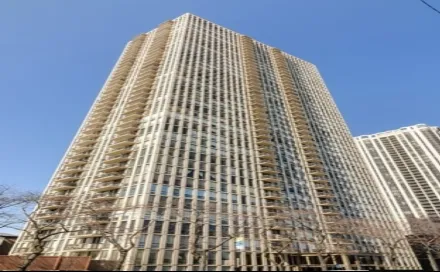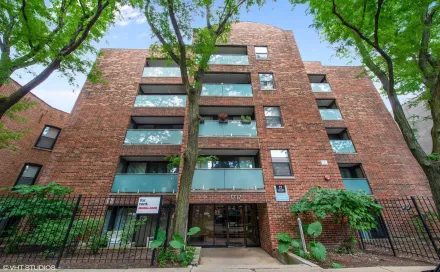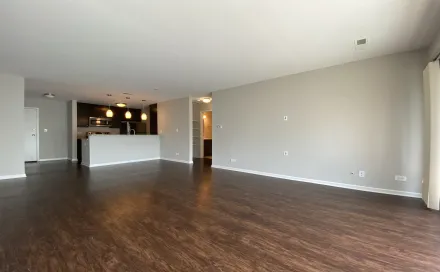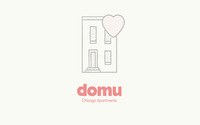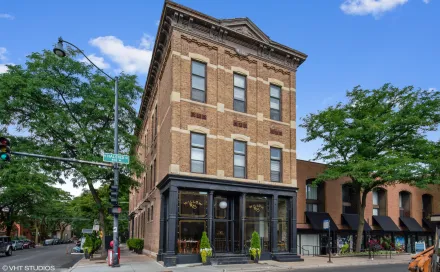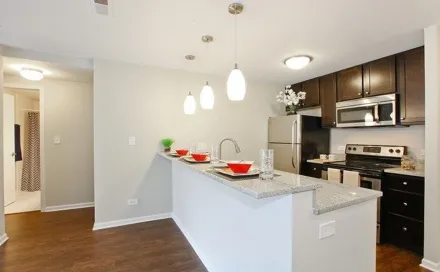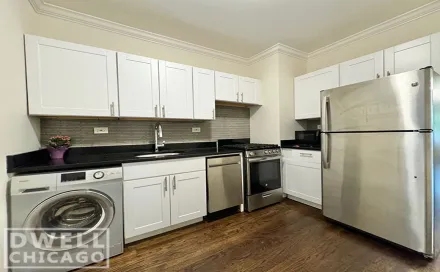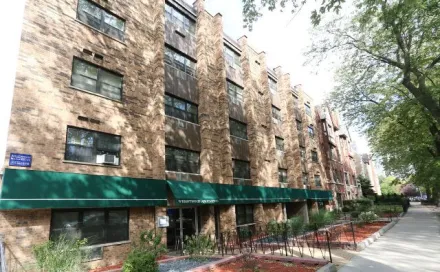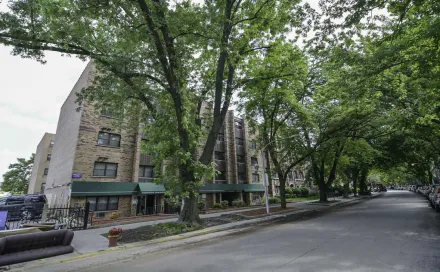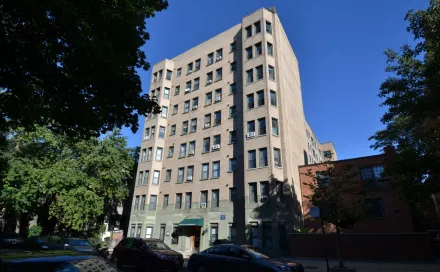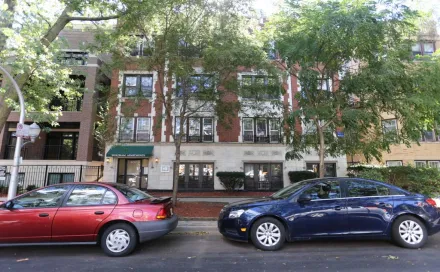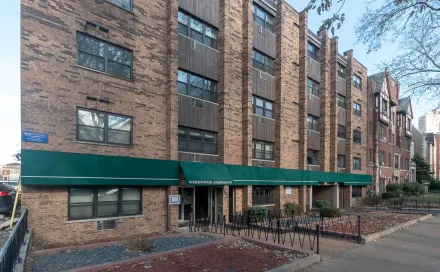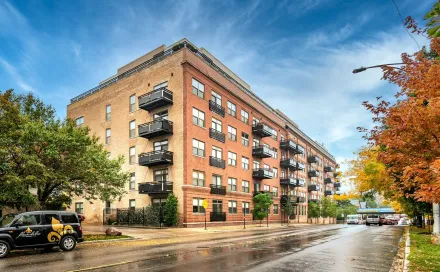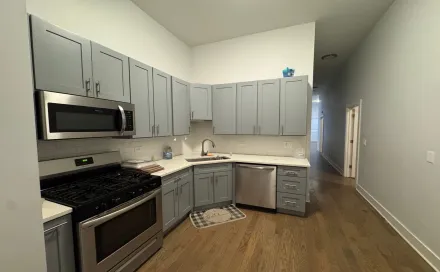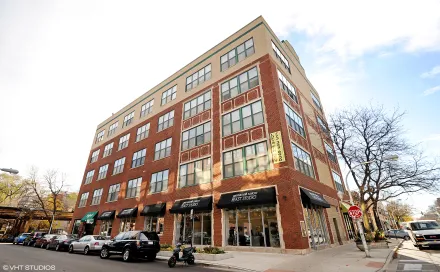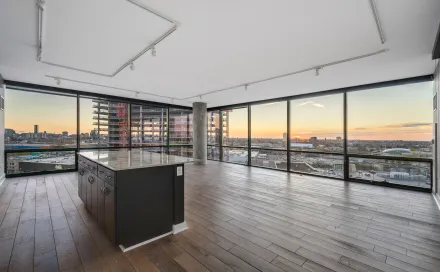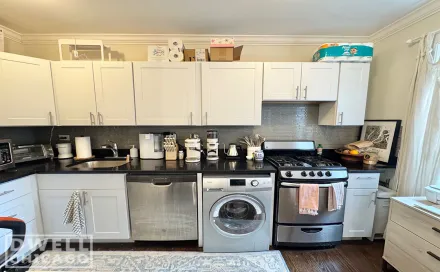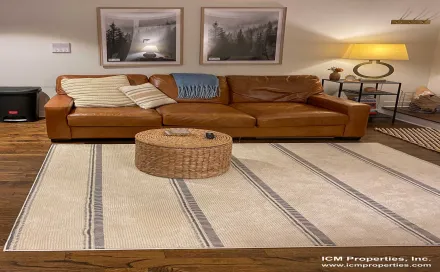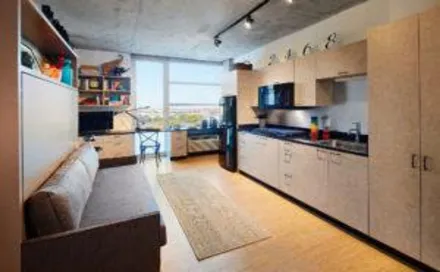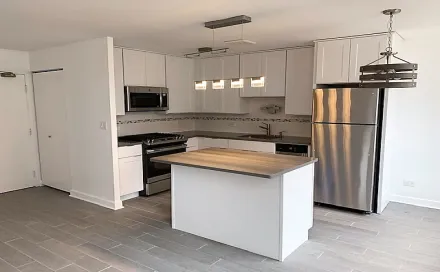Apartments for rent in Lincoln Park
FAQs about Lincoln Park
Lincoln Park offers a balanced vibe of energetic city life and laid-back community charm. It blends youthful energy from DePaul University students with family-friendly tranquility, creating a vibrant yet relaxed neighborhood.
Yes, Lincoln Park is highly family-friendly. Families enjoy access to top schools, multiple parks like Oz Park and Jonquil Park, the Lincoln Park Zoo, the Nature Museum, and kid-focused attractions such as the Pritzker Family Children's Zoo and the Hawver and Lacy Families Nature Playspace.
Lincoln Park Apartment Living
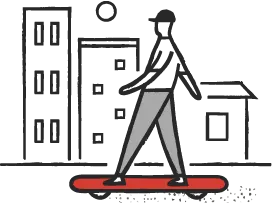
Neighborhood Vibe
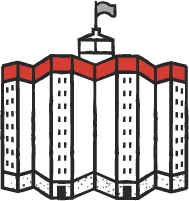
Heart of the Neighborhood
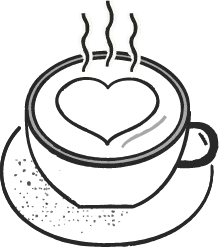
What We Love Most
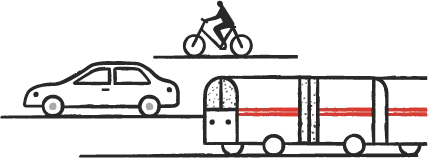
Best Way to Get Around
Find Lincoln Park Apartments
| Find Lincoln Park Apartments | |
|---|---|
|
Studio in Lincoln Park
Average Rent
|
$1.5k-
1.9k
|
|
1 Bedroom in Lincoln Park
Average Rent
|
$2.1k-
2.8k
|
|
2 Bedroom in Lincoln Park
Average Rent
|
$3.0k-
4.3k
|
|
3 Bedroom in Lincoln Park
Average Rent
|
$3.6k-
6.2k
|
|
4+ Bedroom in Lincoln Park
Average Rent
|
$8.5k
|
Around the Neighborhood
Overview of Lincoln Park
If you’re considering renting an Apartment in Lincoln Park, you choose wisely! This North Side neighborhood that spans the 60614 zip code is home to trendsetters and fashionistas, nature lovers and foodie experts, and all for good reason. With its perfect blend of history, culture, entertainment, shopping, dining, outdoor fun, and a multitude of transportation options, it’s hard to question why this is one of the most sought-after places to live.
Demographics of Lincoln Park, Chicago
Get ready to vibe with Lincoln Park, where DePaul students, stroller-pushing families, and remote-working Gen Zers all coexist like it’s no big deal. The median age around here is about 31, so whether you're fresh outta college or deep into your 30s, you’ll fit right in. With about 85% of locals holding a bachelor’s degree or higher, there’s no shortage of smart (and coffee-obsessed) neighbors to debate your latest hot takes with. Lincoln Park is a solid mix of city hustle and small-town chill — and that’s exactly why so many people want to call it home.
Weather in Lincoln Park
I’m sure you’re already aware that the weather in Chicago has a reputation, and life in Lincoln Park is no different. In the summer, you can work on your tan at North Avenue Beach, basking in the glory of 90-degree days. In the fall, you can cozy up with a pumpkin spice latte and watch the leaves change color, hopefully enjoying the many outfit changes as the day goes from chilly to warm and back to chilly. And in the winter, you can embrace your inner snow bunny and brave the cold for that perfect deep-dish pizza (or just stay inside, order delivery, and binge-watch Netflix, we won't judge).
Amenities in Lincoln Park, Chicago
Entertainment and Recreational Activities
With over 1,200 pristine acres honoring the natural world, in Lincoln Park you can get your nature fix without ever leaving the city. Take a stroll through the Lincoln Park Zoo and say hello to the monkeys, then venture over to the Lincoln Park Conservatory for a waltz through their exotic plants collection. You’ll feel like you’re in a tropical paradise while still getting cell service! Wander over to the Peggy Notebaert Nature Museum and your kids will have the time of their lives. Dance with the butterflies in the indoor conservatory, watch the turtles take their daily walk, and then let them burn off that excess energy at the Hawver and Lacy Families Nature Playspace. If that doesn’t quiet them down, there’s also the Pritzker Family Children's Zoo, where kids can get up close and personal with their favorite animals and learn about the importance of conservation.
For those who find history fascinating, the Chicago History Museum should be high on your list. Here, you’ll learn all about the city's sordid past, from the Great Chicago Fire to the gangsters of the 1920s. There’s also Lincoln Hall, a historic concert venue that's been a staple of the Chicago music scene since 1912. With a wild lineup of indie, rock, and hip-hop acts, there's always something new and exciting happening on their stage.
Of course, no local worth their salt would miss out on the Lincoln Park Farmers Market. Held every Wednesday and Saturday from May to October, the market features a wide variety of local vendors selling everything from fresh produce to artisanal cheeses to handmade crafts. It's the perfect spot to grab a bite to eat, do some shopping, and soak up the local vibes.
Parks in Lincoln Park, Chicago
- Lincoln Park: When you walk through Lincoln Park, you might see one or two of the cartoon birds from Disney’s Cinderella chirping a little song. Don’t be frightened, there’s magic here. This park is so big, you could get lost in it for days. With a zoo, a conservatory, and more sports fields than you can count, it's like a one-stop shop for all your outdoor needs.
- Oz Park: If you're a fan of the Wizard of Oz, this park will have you living a dream. With statues of all your favorite characters, you can take a trip down the yellow brick road without ever leaving Chicago.
- Bauler Park: This cozy little park is perfect for a picnic or a game of frisbee with your pals. Just watch out for the hipsters playing acoustic guitar in the corner.
- Jonquil Park: If you need a break from the hustle and bustle of the city, this peaceful little park is the perfect spot to relax and recharge. Just don't forget to stop and smell the jonquils (whatever those are).
Museums in Lincoln Park, Chicago
- Chicago History Museum: If you want to learn about the city's past (and who doesn't?), this museum is a trip through time. From the Great Chicago Fire to the Civil Rights Movement, you'll leave with a newfound appreciation for the Windy City.
- Peggy Notebaert Nature Museum: If you're a nature lover, this museum is your happy place. With interactive exhibits on everything from butterflies to beavers, you'll feel like you're in the great outdoors (minus the bug bites).
- DePaul Art Museum: If you're an art aficionado, this museum is a hidden gem. With a focus on contemporary art from around the world, you'll leave feeling inspired (and maybe a little bit pretentious, but in a good way).
Transportation in Lincoln Park, Chicago
Access to highways
Lincoln Park's location puts you close to the highway. The Kennedy Expressway (I-90/94) runs just west of the neighborhood, and can be accessed via Fullerton Avenue or Armitage Avenue. From there, it's a quick 5-10 minute drive to downtown Chicago or a 20-30 minute drive to O'Hare International Airport, depending on traffic.
CTA Bus Routes in Lincoln Park
The CTA operates several bus routes that run through Lincoln Park, making it easy to get around the neighborhood and to further destinations. Some of the most popular routes include:
- #74 Fullerton: Runs east-west along Fullerton Avenue, connecting Lincoln Park to the Fullerton Red/Brown/Purple Line station and the Belmont Blue Line station.
- #76 Diversey: Runs east-west along Diversey Parkway, connecting Lincoln Park to the Diversey Brown Line station and the Logan Square Blue Line station.
- #151 Sheridan: Runs north-south along Sheridan Road, connecting Lincoln Park to the Belmont Red/Brown/Purple Line station and the Sheridan Red Line station.
- #156 LaSalle: Runs north-south along LaSalle Drive, connecting Lincoln Park to the Loop and the Near North Side.
Buses typically run every 10-15 minutes during peak hours and every 15-20 minutes during off-peak hours.
Metra Train Stops in Lincoln Park
While there are no Metra trains that stop directly in Lincoln Park, the Clybourn Metra station on the Union Pacific North Line is just a short distance west of the neighborhood, about a 5-10 minute drive or a 15-20 minute walk. From there, you can catch trains to Waukegan, Kenosha, and other northern suburbs. •
Distance to downtown and other notable locations
One of the best things about living in Lincoln Park is its proximity to downtown Chicago and other notable locations. Here are some estimated distances and travel times:
- Downtown Chicago (Loop): 3-4 miles, 10-15 minutes by car or 20-25 minutes by public transit
- Wrigley Field: 2-3 miles, 10-15 minutes by car or 20-25 minutes by public transit
- O'Hare International Airport: 15-20 miles, 30-40 minutes by car or 60-90 minutes by public transit
- Millennium Park: 4-5 miles, 15-20 minutes by car or 25-30 minutes by public transit
- Navy Pier: 4-5 miles, 15-20 minutes by car or 30-35 minutes by public transit
Of course, travel times can vary depending on traffic and other factors, but these estimates give you a general idea of how well-connected Lincoln Park is to the rest of the city.
Parking options and availability
Like many Chicago neighborhoods, parking in Lincoln Park can be a bit of a challenge, especially during peak hours. Most residential streets require a parking permit, which can be obtained through the City of Chicago's Residential Parking Permit program.
That said, there are several public parking garages and lots scattered throughout the neighborhood, including the Lincoln Park Zoo parking lot (2400 N. Cannon Dr.), the Chicago History Museum parking garage (1740 N. Stockton Dr.), and the Lincoln Park Center parking garage (2300 N. Lincoln Park West). Rates vary depending on the location and time of day, but typically range from $2-$10 per hour or $20-$30 per day.
Many apartment buildings in Lincoln Park offer dedicated parking spots for residents, either included in the rent or available for an additional fee. If you're considering moving to the neighborhood, it's a good idea to ask about parking options and availability when searching for a place to live.
Schools and Higher Learning Institutions in Lincoln Park
Public, private, and charter school options
If you're looking for an A+ education for your little ones (or not-so-little ones) in Lincoln Park, you've got options galore.
First up, there’s Lincoln Park High School. If you have a teenager who's too cool for school, this is the only public high school game in town. But hey, at least they'll have plenty of company in their teenage angst, right?
For the younger crowd, Abraham Lincoln Elementary School has been holding it down since 1871. Talk about a legacy! If you're on the east side of Lincoln Park, this will be within walking distance of your new pad.
On the west side, Mayer Magnet School is the place for K-8 students. And if you're in the Park West micro-neighborhood, Alcott College Prep will prep your kids for high school and beyond. Last but not least, there’s Prescott Elementary in the Wrightwood neck of the woods.
If you're looking for a private school experience, Lincoln Park has plenty of those too. St. James Lutheran School has small class sizes and focuses on getting kids ready for high school. They have elementary and middle school primed, so you know your kids will be well-prepared for whatever comes next.
If you're into progressive education, Frances W. Parker School is waiting with open arms. They're all about teaching kids to be empathetic, courageous, and clear-headed citizens of the world.
For a faith-based approach, St. Luke Academy will take your toddlers to middle schoolers to new educational heights. They're rooted in the Lutheran tradition, so you know your kids will be getting a healthy dose of religion with their reading, writing, and arithmetic. If Catholicism is more your speed, Saint Clement School and St. Josaphat are both solid options.
University, college, and other higher learning institution options
Lincoln Park itself is home to one of the most well-known universities in the city: DePaul University. As the largest Catholic university in the United States, DePaul offers many undergraduate and graduate programs across multiple schools and colleges. Its main campus is located in the center of Lincoln Park, providing students with easy access to all the neighborhood has to offer.
Another notable institution in the area is Kendall College, a specialized school focused on culinary arts and hospitality management. Located on Goose Island, just a short distance from Lincoln Park, Kendall College has a strong reputation in its field and attracts students from around the world.
For those interested in vocational training, Lincoln Tech has programs in automotive technology, HVAC, and other skilled trades. This hands-on approach to education provides students with the practical experience needed to succeed in their chosen careers.
Venturing slightly further from Lincoln Park, students have access to several other prestigious institutions. Loyola University Chicago, with its main campus in Rogers Park and a secondary campus in the Gold Coast, is a private university known for its commitment to social justice and service learning.
Local Events in Lincoln Park, Chicago
Lincoln Park is a neighborhood that knows how to keep things lively throughout the year. The community calendar is always bursting with exciting events that keep everyone in the neighborhood on their toes and having fun.
One of the most anticipated events is the Lincoln Park Greek Fest, which takes place every June. This celebration of Greek culture and food brings in thousands of visitors who come to enjoy traditional music, dancing, and mouthwatering dishes like gyros, souvlaki, and baklava. It's a weekend full of festive fun and a great way to get to know some of your neighbors.
The Green City Market Chef BBQ Benefit is another summer highlight. This annual event stirs together Chicago's top chefs into a culinary masterpiece as they prepare unique dishes using fresh, locally sourced ingredients from the market. Attendees get to chow down while enjoying live music and mingling with fellow foodies in a festive, outdoor setting.
When winter rolls around, Lincoln Park keeps the festivities going with the Lincoln Park ZooLights. This holiday tradition transforms the zoo into a dazzling display of lights and decorations, creating a magical winter wonderland. Visitors can stroll through the illuminated grounds, sip on hot chocolate, and enjoy special events like ice sculpting demonstrations and visits with Santa.
These are just a handful of the many events that take place in Lincoln Park throughout the year. From farmer's markets and outdoor concerts to cultural festivals and holiday celebrations, there's always something lined up and ready to pop off!
Real Estate in Lincoln Park
Overview of the real estate market
The Lincoln Park real estate market is one of the most sought-after in Chicago, and for good reason. This trendy, sprawling neighborhood offers a dazzling assortment of housing options, from historic greystone houses and brownstones to sleek, modern condominiums and luxury high-rises. While prices in Lincoln Park tend to be higher than some other Chicago neighborhoods, the exceptional quality of life and strong sense of community make it a worthwhile spot to call home.
Rental rates and popular housing styles
One of the most popular housing styles is the classic Chicago courtyard apartment building. These vintage structures, typically built in the early 20th century, offer charming architectural details, spacious floor plans, and the convenience of on-site laundry and maintenance. Rents for a one-bedroom apartment in Lincoln Park typically range from $1,900 to $2,400 per month. Two-bedrooms start at $2,500 while three-bedrooms, somewhat rare, are often listed starting at $3,200.
For those seeking a more modern living experience, the neighborhood also offers a selection of new apartments and high-rise buildings. These properties often feature state-of-the-art amenities like fitness centers, rooftop decks, and in-unit laundry. Rents for these newer apartments tend to be higher, with one-bedroom units starting around $2,300 per month and going up to $3,000 or more for premium properties.
Single-family homes and townhouses are also popular options for renters in Lincoln Park, particularly for families or those who desire more space and privacy. These properties range from cozy, historic rowhouses to grand, multi-story homes, and rents can vary widely depending on size, location, and amenities. On average, renters can expect to pay anywhere from $3,000 to $8,000 per month for a single-family home in Lincoln Park.
Popular Apartment Buildings in Lincoln Park
Elevate Lincoln Park Apartments
The Residences at NewCity Apartments
The Belden Stratford Apartments
2756 North Pine Grove Apartments
451 West Wrightwood Apartments
Future Development in Lincoln Park Chicago
There are a number of new developments lined up for Lincoln Park, expanding the rental market and adding more homes for those aching to get a spot in this desirable neighborhood. Directly adjacent to Lincoln Yards is a soon-to-be-built 25-story mixed-use building. It will hold 355 residential units with 7,500 square feet of retail space overlooking an outdoor park.
One of the most notable recent acquisitions is 939 W. North, a Class-A, mixed-use property that spans approximately 200,000 square feet. The building, which was acquired by Farpoint Development and MCZ Development Group, features a mix of retail, fitness, and medical office space, as well as an attached 350-space parking garage for visitors. Its location is just steps away from a wide assortment of premium retailers, including Apple, Crate & Barrel, Whole Foods, and Lululemon. With convenient access to the CTA Red Line, which connects Lincoln Park to the rest of the city, 939 W. North is poised to become a hub of activity and a sought-after destination for both residents and visitors.
Another exciting development on the horizon for Lincoln Park is the proposed redevelopment of Clybourn Place, a mostly vacant shopping center located at 1800 N. Clybourn. CRM Properties, the owner of the property, has unveiled plans for a transformative project dubbed the Willow Street District. This ambitious undertaking, designed by Lamar Johnson Collaborative, would breathe new life into the underutilized space by introducing a mix of residential and retail offerings.
The centerpiece of the Willow Street District would be a stunning 520-foot-tall residential tower, set to replace a vacant, single-story retail structure and surface parking along N. Marcey St. This luxury rental tower would house 500 units and feature additional parking for residents, adding to the neighborhood's already impressive array of high-end living options.
Conclusion
So, you're thinking about making Lincoln Park your new home? Congratulations, you've got great taste! This neighborhood is the total package, serving up a perfect blend of big-city excitement and laid-back charm. It's the kind of place where you can spend your days exploring world-class museums and your nights dancing the hours away at a blues club, all while surrounded by some of the most stunning architecture in the city.
But what really sets Lincoln Park apart is its sense of community. Whether you're grabbing a cup of coffee at your favorite local spot or cheering on the Cubs at a neighborhood bar, you'll always feel like you're part of something special. And with its unbeatable location right on the shores of Lake Michigan, you'll never run out of reasons to fall in love with this neighborhood.
Ready to make Lincoln Park your new home? On Domu, you'll find an unbeatable selection of apartments that'll make you want to sign on the dotted line faster than you can say "deep-dish pizza." Trust us, once you experience life in Lincoln Park, you'll wonder how you ever lived anywhere else. So what are you waiting for? Your dream apartment awaits!
Search Lincoln Park Apartments by Unit Type
Find your perfect Lincoln Park apartment for rent based on size by refining your search to your desired floor plan. Search Lincoln Park studios, one bedroom, two bedroom, three bedroom, and four bedroom apartments for rent.
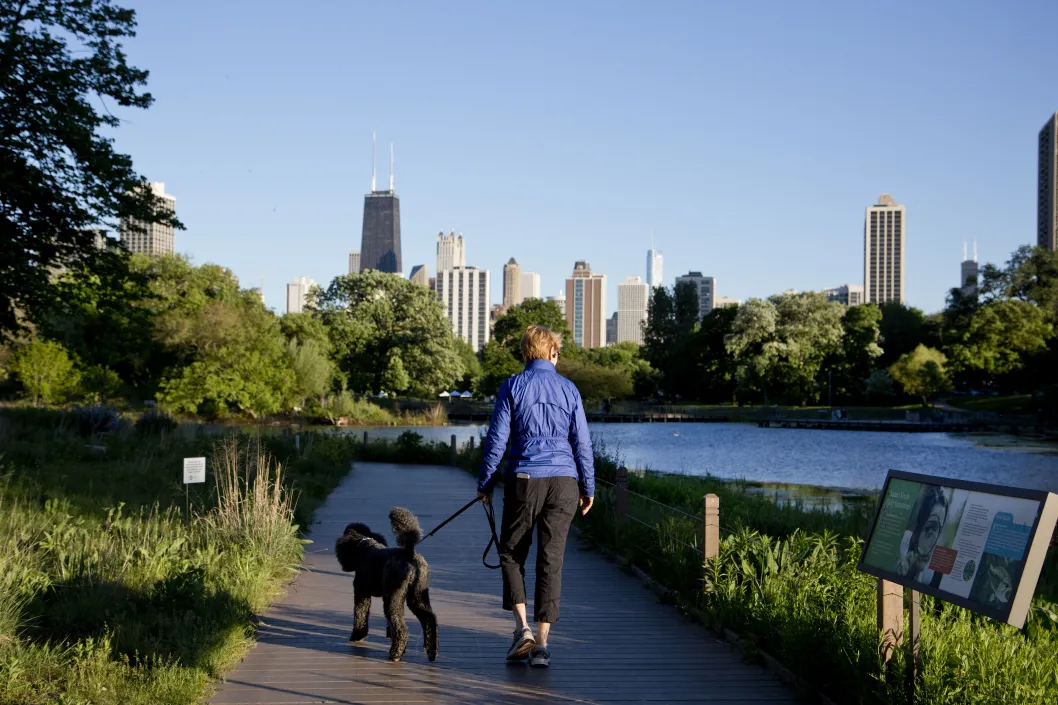
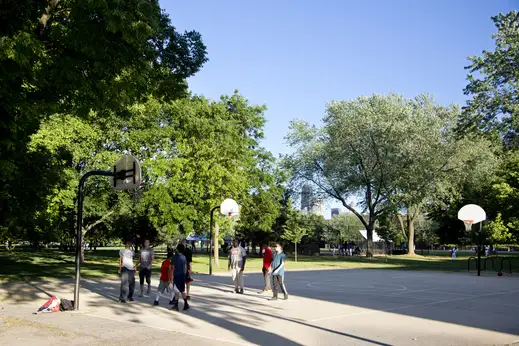
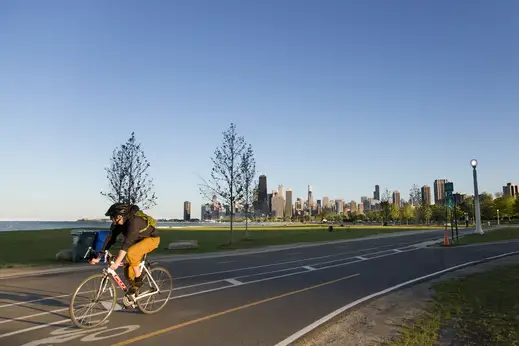
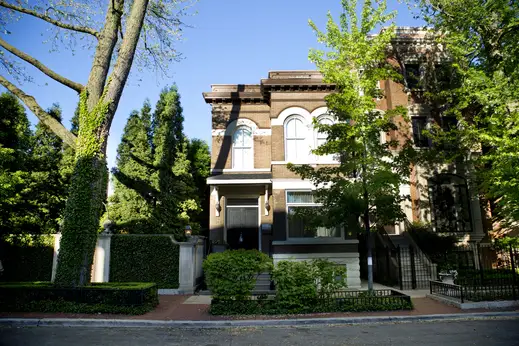
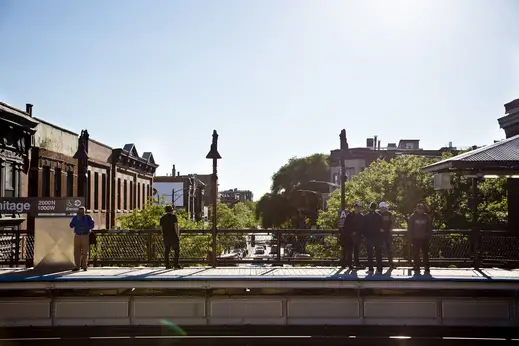
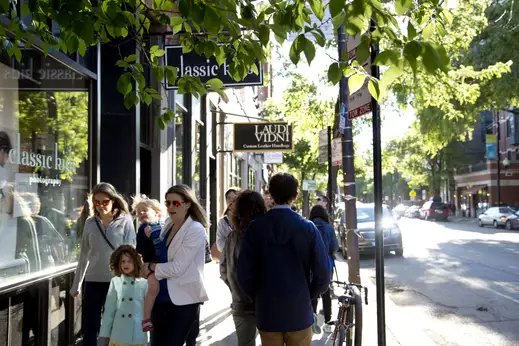
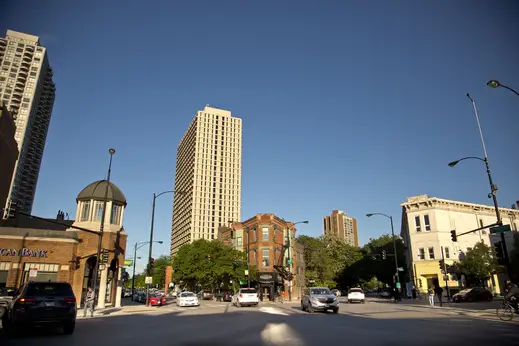
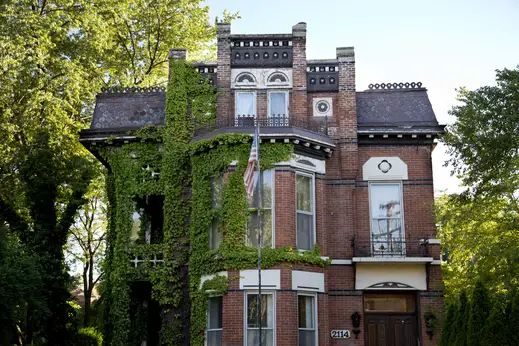
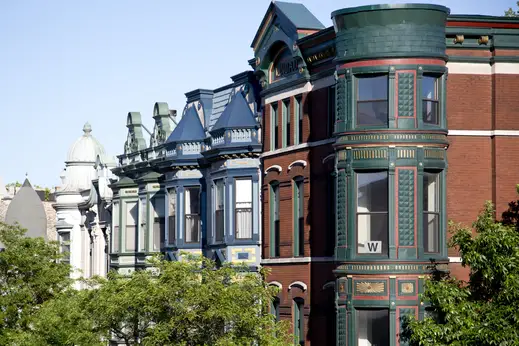
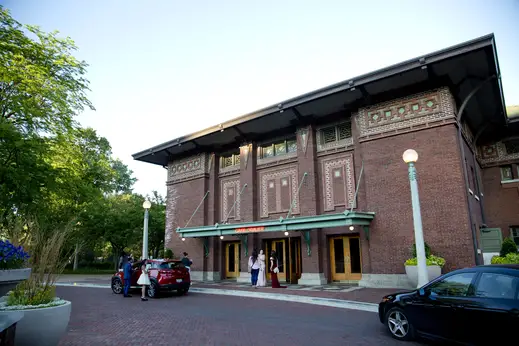
Shopping & Dining in Lincoln Park
If retail therapy is your go-to mood booster, Lincoln Park has you covered. Armitage Avenue is like Chicago's own Rodeo Drive, featuring high-end boutiques and designer stores that'll make your credit card do a happy dance. For unique finds, Clark Street offers an eclectic mix of vintage shops and indie retailers. Halsted Street also boasts a popular strip with favorites like Lululemon, Club Monaco, and more.
Feeling hungry? The Armitage and Sheffield L stop is your gateway to some of the city's best eats. Lincoln Park's dining scene is a culinary playground:
- Lou Malnati's Pizzeria: Craving deep-dish pizza that's a true Chicago classic? Lou Malnati's at 958 W. Wrightwood Ave serves up slices so deep, you might need a snorkel to find the toppings.
- The Wiener's Circle: For a hot dog experience that's as entertaining as it is delicious, head to The Wiener's Circle at 2622 N. Clark St. Just remember, asking for ketchup might earn you some playful banter.
- Alinea: Looking for a dining experience that's out of this world? Alinea at 1723 N. Halsted St. offers a Michelin-starred journey through innovative, modernist cuisine.
- Café Ba-Ba-Reeba!: Tapas lovers rejoice! This lively spot at 2024 N. Halsted St. serves up authentic Spanish small plates and sangria in a vibrant atmosphere.
- Athenian Room: For hearty Greek fare in a cozy setting, visit Athenian Room at 807 W. Webster Ave. Their Kalamata chicken is a neighborhood favorite.
Whether you're indulging in retail therapy or savoring diverse culinary delights, Lincoln Park offers a dynamic mix of shopping and dining experiences that cater to every taste.
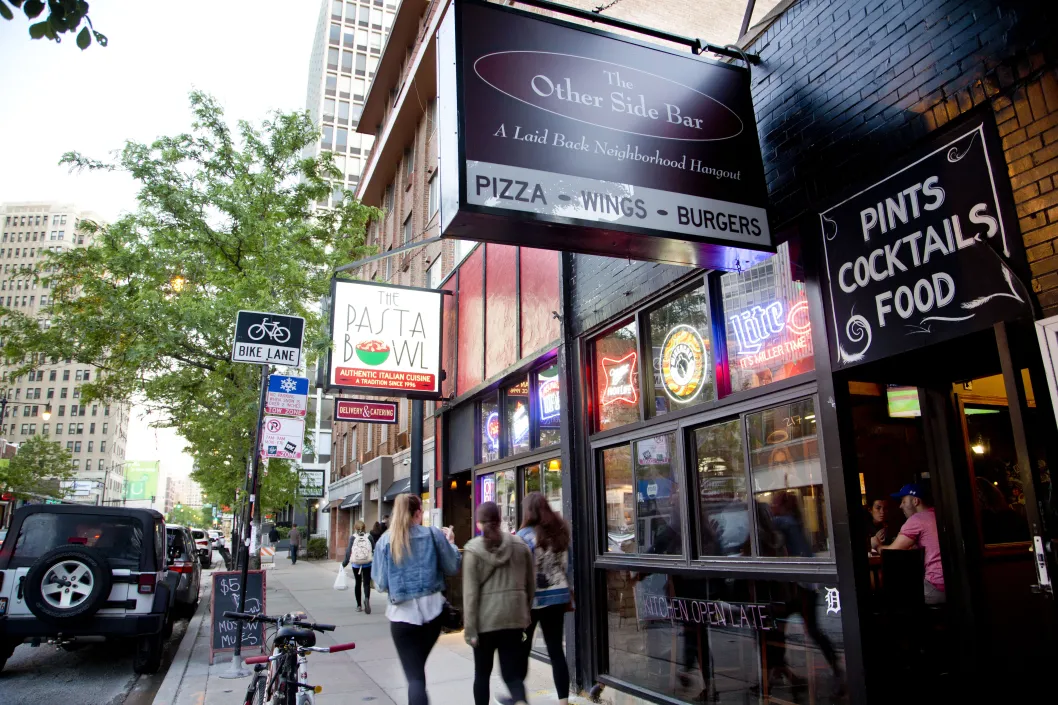
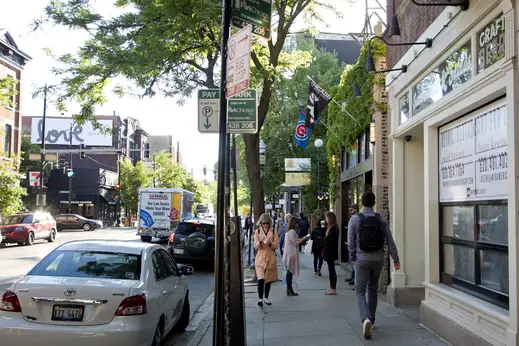
Nightlife in Lincoln Park
When the sun clocks out, Lincoln Park clocks in. If you're trying to wake up with sore legs from dancing like nobody’s watching, hit up Kingston Mines — their live blues will have your soul throwing a party. Want a night that feels like you time-traveled straight into a Gothic novel? King of Cups is your move. Moody cocktails, dark velvet vibes, and just the right amount of “is that a vampire or just a really well-dressed guy?” energy. And if you're keeping it lowkey, Lincoln Avenue’s packed with pubs perfect for laughing too loud over a cold one — all conveniently within wobbling distance of your new Lincoln Park apartment.
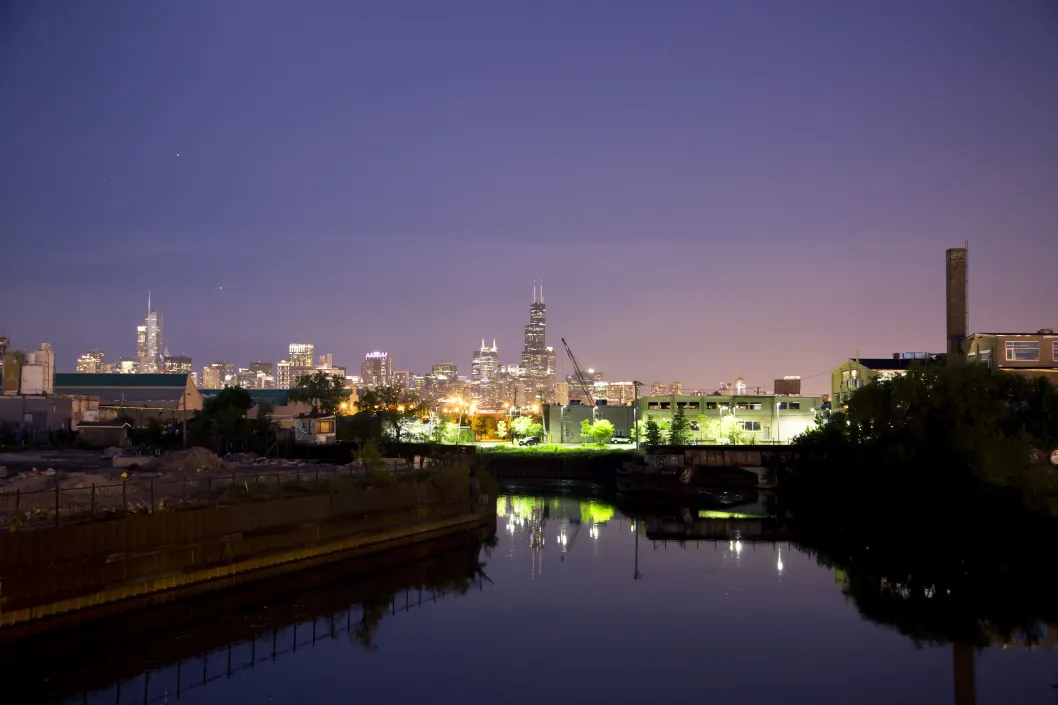
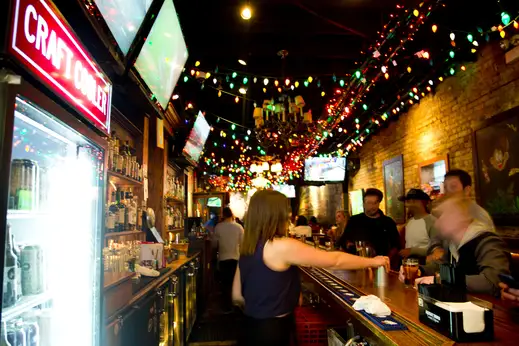
Coffee in Lincoln Park
Lincoln Park locals have no trouble getting their caffeine fix — or their favorite cozy corner to sip it in. One neighborhood gem is The Bourgeois Pig Cafe on Fullerton Avenue, where the eclectic vibe and old-world charm make every latte feel like a storybook scene.
- Intelligentsia Coffee: For serious coffee lovers, this Chicago-born icon near Broadway pours top-tier brews in a sleek, no-frills setting.
- Elaine’s Coffee Call: A tucked-away gem inside Hotel Lincoln serving up top-notch espresso and cozy vibes — perfect for mornings that turn into afternoons.
- Colectivo Coffee: A bright and airy café on Clark Street, offering a spacious patio and a menu of handcrafted drinks and fresh bakery items.
- Vigo Coffee: A stylish, independently owned café serving expertly crafted drinks with a friendly vibe right on Lincoln Avenue.
History in Lincoln Park
Long before it became one of Chicago's popular neighborhoods, Lincoln Park was a lush, forested grassland home to Native American tribes, a tiny cemetery, and a smallpox hospital. It was a far cry from the trendy neighborhood of today, and not a place many went for fun and excitement. As the mid-1800s came roaring in and the assassination of Abraham Lincoln rocked the nation, the area was named Lincoln Park in his honor, and the transformation began.
Starting with two New York swans making their home in the newly established Lincoln Park Zoo, as the 19th century drew to a close the ball really started rolling on this neighborhood’s personality shift. Lincoln Park experienced a wave of development that saw it officially annexed into Chicago's city limits, and the clang of streetcars and the buzz of trolleys soon filled the air. These additions made the area more accessible and attractive to a new generation of residents, some of whom were not welcomed with open arms.
The roaring 20s brought with it a surge in gang warfare, with the infamous St. Valentine's Day Massacre painting the streets red just steps away from where the chic Bourgeois Pig Café now stands. And when the Great Depression hit, Lincoln Park found itself in a state of disrepair that lingered like a bad hangover until the mid-20th century.
It took the arrival of the Puerto Rican community to give Lincoln Park the shot in the arm it needed. These first-generation immigrants rolled up their sleeves and got to work, using urban development funds to breathe new life into historic buildings and spruce up neighborhood schools. But this facelift came with a price tag, as low-income housing was bulldozed to make way for shiny new developments, and original residents found themselves priced out of the neighborhood they called home.
Fast forward to the 21st century, and Lincoln Park had shed its rough-and-tumble reputation and emerged as a trendy spot for the young and the restless. Gated communities, high-rise apartments, and swanky condominiums became the norm, with 70% of residents under 40 and ready to make their mark on the world. And with money comes development, as new restaurants, boutiques, parks, and schools popped up faster than you could say "gentrification."
Today, Lincoln Park is a neighborhood that dresses up its rich history with modern flair. You can stroll down streets lined with stunning architecture that tells the story of the neighborhood's past, while popping into hipster cafes and artisanal shops that showcase its modern-day marvels. And with its ideal spot along the shores of Lake Michigan, Lincoln Park offers a slice of natural beauty that's hard to find anywhere else.

